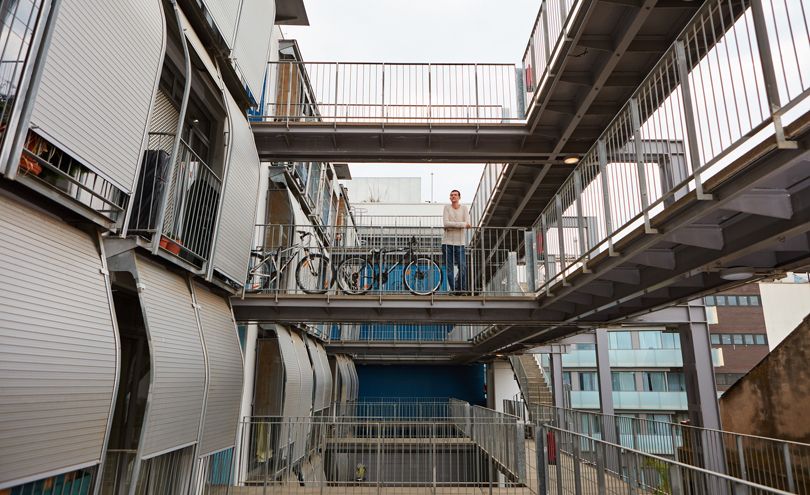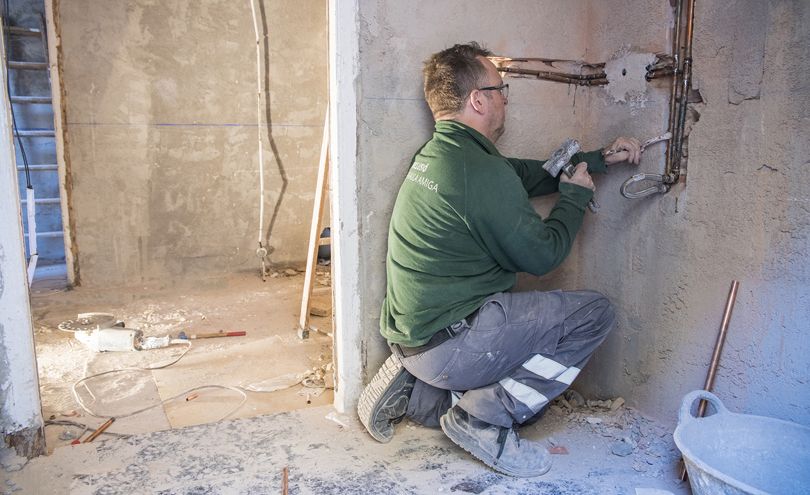When three stark naked Italian tourists wandered Barcelona’s port district for several hours in August 2014, it seemed that the city had reached peak overtourism. In response to the au naturel frolic, angry residents of the Barceloneta neighborhood formed vigilante groups to confront owners of the short-term rental apartments they accused of destroying their once tranquil working-class enclave and shrinking the affordable housing supply in a city reeling from a nationwide foreclosure crisis.
That latter issue was front of mind a few months later, when an umbrella group of some 3,000 Catalonian charities and nonprofits known as the Third Sector Table came together and created a new entity, Hàbitat3, tasked with figuring out some way of making a dent in the region’s affordable housing crisis, centered on metro Barcelona. Indeed, naked Italians renting a flat that could serve as a family’s home was just the tip of the iceberg. The 2008 financial crisis had burst Spain’s housing bubble, leaving tens of thousands in the construction sector out of work and leading to foreclosures on hundreds of thousands of homes.
Even a decade later, the ramifications of the housing bust are a sizable housing backlog in Catalonia, with a deficit of some 170,000 affordable homes even as an estimated 450,000 sit vacant. Xavier Mauri, a Catalan housing expert who has worked for the non-profit sector his entire career, saw these vacant properties, especially the foreclosed ones now in the hands of banks, as a prime opportunity.
“That was our first premise, that the banks would let us access the houses for cheap, because we didn’t have any money,” Mauri tells Next City on the sidelines of World Urban Forum 10.
Over five years later, they continue to give him the runaround. Mauri puts on his best imitation banker’s voice: “How interesting, we’ll look into this, we’ll get back to you,” he says of the noncommittal response he has gotten time and again from Spain’s banks, which he believes are speculatively holding onto foreclosed properties in the hopes of a market rebound. He has gotten as far as a written memorandum of understanding with one large bank, but that agreement still hasn’t resulted in a needy family tucking in for the night in one of the bank’s vacant apartments.
“This first approach didn’t work and it was a serious problem for Hàbitat3, because we didn’t have any homes to show for our effort,” Mauri says.
Fortunately, Hàbitat3 hadn’t put all their eggs in one basket. As they started down the road of convincing reluctant banks to hand over the keys for families in need, they also struck up a conversation with then center-right Barcelona mayor Xavier Trias’ administration. Faced with an ever escalating roster of immigrant and working-class families on the city’s emergency housing waitlist, Trias allocated €6 million (about $6.5 million USD) over four years and told Hàbitat3 they had to figure out how to get at least 200 families into housing with that money.
That’s when Mauri went with plan B. All over Barcelona and its suburbs, families with property have extra apartments. Maybe someone’s childless aunt died with no heirs, then she left her place to a nephew. The nephew has no idea what to do with his aunt’s former apartment now in need of new drywall and a fresh paint job, so it sits there empty.
These kinds of vacant apartments are symptomatic of Spain’s sclerotic rental housing market. Historically, Spanish housing policy has heavily favored homeownership. 51 percent of Spaniards own, about 8 percent higher than the average for Organization for Economic Cooperation and Development countries. Meanwhile, less than 15 percent rent on the private market (compared to an OECD-wide average of 22 percent). And a mere 2.8 percent live in subsidized rentals, compared to 4.6 percent across the 36-member bloc of developed countries.
Mauri realized that there was still an opportunity to get people into vacant but perfectly good housing. Hàbitat3 began serving as the middleman between the city and these hypothetical landlords. The charity found owners of vacant units and made them a sweetheart deal: a 36-month lease for an average of €500 per month, as well as a few rent-free months on either end to perform upfront renovations and post-move out repairs. That work, in turn, serves as a training opportunity for returning citizens and other disadvantaged groups that the Third Sector Table’s constellation of charities serves.
In turn, families placed in the housing only paid €150 per month in rent. The municipal government allocation picked up the difference, effectively an ad hoc, city-run version of the Section 8 voucher program in the U.S. With each landlord, Hàbitat3 signed the lease in order to provide the owner with assurance that the rent would get paid. Then they turned around and signed a sublease with the actual tenant, screened and provided to them by City Hall.
The program proved so popular that Mayor Ada Colau, a leftwing firebrand who arose from the movement to fight Spain’s foreclosures, reupped the agreement last year for another €19 million (about $20.1 million USD) in partnership with the Catalonia regional government. There are now 500 units across Catalonia in Hàbitat3’s management portfolio.
While Hàbitat3’s innovation was a remarkable response to an emergency situation, it has diminishing returns. With Spain’s economy out of the doldrums, €500 isn’t what it was five years ago. “The fight to secure apartments is getting harder as the market recovers,” Mauri says. Today Hàbitat3 pays on average €650 to the small-time landlords while still keeping the rents fixed at €150 for tenants. Although 80 percent of landlords renew their leases to take on another tenant, increasingly more landlords see the private rental market or Airbnb as more attractive than renting to Hàbitat3.

(Photo courtesy Hàbitat3)
Hàbitat3’s experience in Catalonia is consistent with what the OECD has tracked across the industrialized world. “If you subsidize access to housing, you’re typically not helping the poorest people in the country,” says Rudiger Ahrend, the head of the OECD’s urban program.
What’s more, while autonomous regions like Catalonia are largely free to do as they please, on some matters, like the legality of rent control, Madrid makes the rules. “Barcelona would like to be like Berlin and regulate the max price of rentals,” says Francesca Bria, the city’s former CTO who designed the technical side of the city’s short-term rental policy to ensure Airbnb forked over data to the municipal government. “But we need permission from the national level.”
Consequently, Hàbitat3 is now exploring yet another type of affordable housing policy, this time the “housing first” model of buying a property in order to manage it for people with substance, mental, and behavioral health issues. Today Hàbitat3 owns 55 units with a loan in the works to buy more, but the scrappy non-profit faces an uphill battle.
“We started from zero with no resources,” Mauri says. “We need a financial system to produce housing.”
Or, as Mauri’s colleague Natalia Martínez laments, “We’re 50 years behind northern Europe and the U.S.”
Our special correspondent Gregory Scruggs will be in Abu Dhabi to cover World Urban Forum 10, taking place February 8 through 13, 2020. To stay on top of the essential conversations and innovative solutions presented at WUF 10, sign up for Urban Planet, our global sustainability newsletter.

Gregory Scruggs is a Seattle-based independent journalist who writes about solutions for cities. He has covered major international forums on urbanization, climate change, and sustainable development where he has interviewed dozens of mayors and high-ranking officials in order to tell powerful stories about humanity’s urban future. He has reported at street level from more than two dozen countries on solutions to hot-button issues facing cities, from housing to transportation to civic engagement to social equity. In 2017, he won a United Nations Correspondents Association award for his coverage of global urbanization and the UN’s Habitat III summit on the future of cities. He is a member of the American Institute of Certified Planners.


















